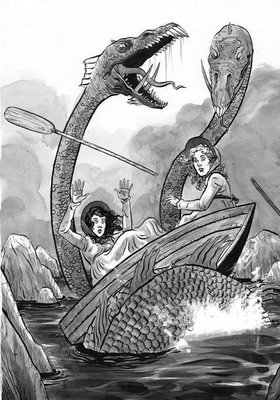 Put on your thinking caps, dear readers. SRSBZNZ is going to be srsly intellectual today, because we're talking about the phenomenon known as the "literary mashup" (LM). This isn't the first time we've done a post on this topic: a little while ago, we published a brief review of Pride and Prejudice and Zombies. We still haven't finished the book, and for various reasons, we probably never will. But before we delve into those reasons, it might be useful to discuss what a "literary mashup" actually is.
Put on your thinking caps, dear readers. SRSBZNZ is going to be srsly intellectual today, because we're talking about the phenomenon known as the "literary mashup" (LM). This isn't the first time we've done a post on this topic: a little while ago, we published a brief review of Pride and Prejudice and Zombies. We still haven't finished the book, and for various reasons, we probably never will. But before we delve into those reasons, it might be useful to discuss what a "literary mashup" actually is.Essentially, the LM mixes your favorite works of literature with sci-fi/fantasy tropes. A cursory search on Amazon suggests that zombies are the trope du jour, with vampires getting an honorary mention:
- Pride and Prejudice and Zombies.
- Jane Bites Back.
- The Adventures of Huckleberry Finn and Zombie Jim.
- The Undead World of Oz: L. Frank Baum's The Wonderful Wizard of Oz Complete With Zombies and Monsters.
- Mr. Darcy, Vampire
Well. Those are pretty hefty things to attribute to a novel about zombies. We at SRSBZNZ obviously love zombies (figuratively speaking, of course.) And we love literature. But like sex and alcohol, sometimes two enjoyable things just shouldn't mix.
To us, LMs are gimmicky. Writers and publishers seem to be adding blood, brains, and monsters to Jane Austen simply because it's "cool" to update literature in this way. Although classics need to be constantly reinterpreted in order to survive, the gratuitous addition of violence and horror underestimates the intelligence of readers. It suggests that without gore and pop culture references, we won't expose ourselves to literature voluntarily, because our generation is lazy, and we possess the attention span of a gnat (EDIT: we at SRSBZNZ admit that we're easily distracted. But not when it comes to literature.)
Another point: why can't we promote the merits of literature on its own terms? Why do we need to add monsters to Mark Twain's text in order to convince people that Huck Finn is actually a good story? It's akin to HarperCollins slapping a Twilight-esque cover on classics like Wuthering Heights and declaring the novel "Bella's Favorite." Barf.
LMs do have their good points. It takes a certain amount of ingenuity and wit to rework the opening line of Pride and Prejudice into this: “It is a truth universally acknowledged that a zombie in possession of brains will be in want of more brains.” And LMs do have snazzy titles. But whether or not a literary mashup can stand as an interesting novel in its own right is debatable.
Having said all this, we at SRSBZNZ will probably continue to read LMs in the hope of finding The One. After all, people continue to mix sex and alcohol all the time, and sometimes - if the stars are aligned - it can be really awesome.





